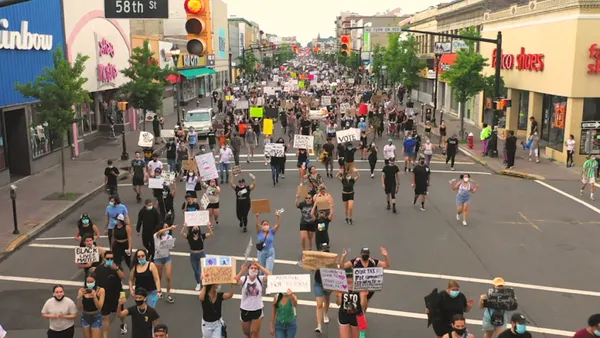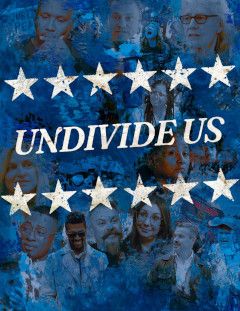Eye For Film >> Movies >> Undivide Us (2023) Film Review
Undivide Us
Reviewed by: Jennie Kermode

If you pay attention to social media, or even to mainstream media, these days, you’re going to hear a lot of talk about war. War in Europe, war in the Middle East, potential military expansion by China, and also the prospect of civil war in the US. As always, this sort of thing should be treated with caution. It’s often used for political or commercial reasons, so shouldn’t be taken on trust – but equally, it’s possible for people to talk themselves into wars which might otherwise be avoided. Kristina Kendall’s film begins with experts expressing their belief that factors which commonly emerge prior to civil wars are now emerging in the US, and asks what, if anything, can be done about this.
The problem stems, Kendall suggests, from ordinary people’s political views becoming so polarised that social bonds break down and they no longer feel able to pass the time of day as potentially awkward but tolerant neighbours. Her film centres on efforts to remedy this by bringing together groups of people with different views and encouraging them to empathise with one another. This makes use of the “What do you think they think?” technique, which is not as new as viewers might be led to think, but which the average person doesn’t really have much experience of – and these are very much the mainstream US idea of average people. They don’t think of themselves as political. Their backgrounds vary but they all seem relatively comfortable. They are, notably, somewhat insulated from the nastier debates taking place in the country today, or at least they think of themselves that way.

Some of them have had enough experience of political debate to be nervous. One man says that he’s hesitant about such conversations because of the way they can turn personal. What ensues will leave him smiling. There is no doubt of the good intentions involved, and of the usefulness of meetings like this for emotional healing. But there are a whole host of problems which the film never addresses, and it doesn’t succeed in making its case that the meetings are politically useful.
One of the issues here is that there doesn’t seem to be a very good understanding of how things already work. “How do you fight antisemitism?” we are asked at one point. “It’s not through advocacy organisations.” We are told about how one woman tackled the issue by spending time with antisemitic people and gradually winning them over – which is, in fact, exactly the sort of thing that advocacy organisations often organise. There is a lot of talk about empathy going hand in hand with attacks on an ill-defined ‘political class,’ to whom no empathy is extended.
We also get treated to the familiar assertion that people need to come out of their bubbles, with no reflection on what that costs in mental health terms for people who find themselves frequently subject to abuse or threats of violence. We’re told, “If you’re thinking ‘Oh my God, how could somebody be thinking that way?’ then you’re missing something,” which may be true from a psychological perspective, but doesn’t address the ethical difficulties or practical limitations of obliging people to treat every antagonist as if they were well-intentioned and sincere.
You won’t need any background in politics to guess the topics under discussion: gun control, teachers versus parents, immigration, policing, abortion. Useful work could be done in any of these areas but there are two key problems: firstly, an illusion of neutrality, and secondly, an absence of expertise.
A discussion about children and gender sums this up. “If a little girl is saying she wants to be treated as a boy...” the question begins – introducing an assumption about the child’s ‘true’ gender a priori, and the two people engaged in discussion go on to agree that a difference of sexuality is fine but when it’s gender it’s “a whole different ballpark” without anybody asking them why they think that or what they imagine it involves. They then decide that parents should always be contacted in that situation, which, in practice, is something that places children at elevated risk of abuse. This folly extends to other areas, such as an agreement that there’s no need to worry about the police if they’re using non-lethal weapons which neglects to recognise that such weapons are used more casually and do actually kill people.
A lot of the assertions made in the discussions are vague or completely unfounded, which leaves the participants striving to find balance between positions founded on fact and those founded on pure conjecture. A compromise between the truth and a lie is, of course, always going to be a lie. These things are not the same. There is no rational middle ground.
Something similar applies when we start looking for compromise on issues like antisemitism. Even if it seems warm and positive from a safe distance, to agree that it’s okay to be just a little bit antisemitic is to throw Jewish people under the bus and build your peace upon their bodies. There’s a word for compromising with fascism: appeasement. And every time it happens, as history has shown us, fascists make their position a little more extreme, and ask for another compromise, all in the name of being civil and reasonable, and all too often they get away with it because people miss the fact that they’re not really interested in peace-building at all, they’re just there to exploit the process.
All this brings us back to the film’s underlying assumption, forcing a very uncomfortable question: is preventing civil war always the most important consideration? The last US civil war killed around 620,000 people directly and, through the destruction of infrastructure, perhaps a million more, but it led to the (admittedly gradual) end of chattel slavery, which saw around ten million people treated horrifically throughout lives which, in the vast majority of cases, ended prematurely.
Preventing war is of course a noble aim, but war is not always the lesser evil, and compromise is all too often forged at the expense of more vulnerable groups. By ignoring this uncomfortable reality, Undivide Us falls short of presenting a real solution and opens the door to bad actors. It is no doubt well intentioned but it lacks intellectual rigour and shows no awareness of the vast body of work already done in this area. No doubt it will soothe some worried viewers, but sugar pills always taste better than real medicine.
Reviewed on: 29 Apr 2024
















